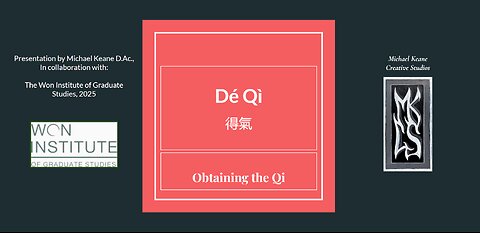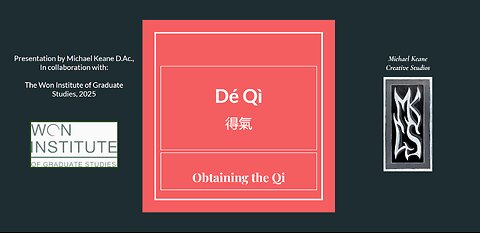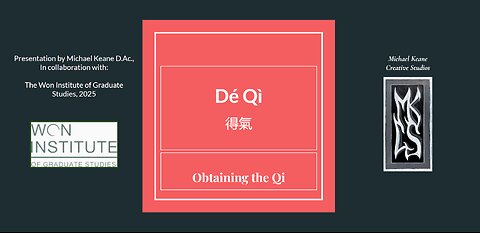
'De Qi' - Obtaining the Qi in Acupuncture Treatment - 3 Part Course
3 videos
Updated 6 months ago
This 3-part presentation explores the concept of De Qi, an important concept in acupuncture practice, theory, and scientific research. It is an essential concept for acupuncturists, and mastery of De Qi will directly improve clinical efficacy for acupuncturists in the clinic.
Since the beginning of acupuncture writings De Qi has played a prominent role in the theory of acupuncture, going back to the Neijing Suwen and Lingshu, and continuing through the ages of Chinese medicine and acupuncture's development.
In modern times, with the scientific research of acupuncture, De Qi plays a pivotal role. For example, in fMRI studies, De Qi is considered to be an important effect for attaining the full neurological effects of acupuncture treatments. Studies show a powerful neurological difference between De Qi and negative sensations such as sharp pain.
Understanding the full range and depth of the concept of De Qi will have direct implications for everyday clinical acupuncture practice. Every single acupuncture treatment can be optimized with a deep understanding of this concept, and it is a foundational and essential concept for acupuncturists to master.
Part 2 will explore De Qi and how it is experienced by both patients and practitioners. We will learn what De Qi is supposed to feel like for the patient, and which sensations are harmful or negative towards acupuncture efficacy. We will look at studies which explore the most common De Qi sensations, and what acupuncturists should expect to feel when they attain the Qi in the clinic.
Part 3 will examine acupuncture research to understand how De Qi is involved in the mechanisms of acupuncture. We will look at how the fascia is related to De Qi via needle grasp phenomenon. Also, we will see how De Qi initiates system wide modulatory actions throughout the nervous system and other systems of the body. fMRI research will show the neuromatrixes and brain regions relevant to acupuncture and De Qi.
At Herb And Needle, we create graduate level courses on acupuncture, herbal medicine, and Chinese medicine topics. Visit our website and sign up for our newsletter to learn when we publish new content and courses.
If you are an acupuncturist, this course and its contents are available for CEU/PDA credits. Check our website below for more information.
https://herbandneedle.com/
-
'De Qi' - Obtaining the Qi Pt 3 - fMRI Acu Neuromatrixes, CNS, PNEI, and De Qi Clinic Variables
 Herb and NeedleThis course explores the concept of De Qi, an important concept in acupuncture practice, theory, and scientific research. It is an essential concept for acupuncturists, and mastery of De Qi will directly improve clinical efficacy for acupuncturists in the clinic. Since the beginning of acupuncture writings De Qi has played a prominent role in the theory of acupuncture, going back to the Neijing Suwen and Lingshu, and continuing through the ages of Chinese medicine and acupuncture's development. In modern times, with the scientific research of acupuncture, De Qi plays a pivotal role. For example, in fMRI studies, De Qi is considered to be an important effect for attaining the full neurological effects of acupuncture treatments. Studies show a powerful neurological difference between De Qi and negative sensations such as sharp pain. Understanding the full range and depth of the concept of De Qi will have direct implications for everyday clinical acupuncture practice. Every single acupuncture treatment can be optimized with a deep understanding of this concept, and it is a foundational and essential concept for acupuncturists to master. Part 2 will explore De Qi and how it is experienced by both patients and practitioners. We will learn what De Qi is supposed to feel like for the patient, and which sensations are harmful or negative towards acupuncture efficacy. We will look at studies which explore the most common De Qi sensations, and what acupuncturists should expect to feel when they attain the Qi in the clinic. Part 3 will examine acupuncture research to understand how De Qi is involved in the mechanisms of acupuncture. We will look at how the fascia is related to De Qi via needle grasp phenomenon. Also, we will see how De Qi initiates system wide modulatory actions throughout the nervous system and other systems of the body. fMRI research will show the neuromatrixes and brain regions relevant to acupuncture and De Qi. At Herb And Needle, we create graduate level courses on acupuncture, herbal medicine, and Chinese medicine topics. Visit our website and sign up for our newsletter to learn when we publish new content and courses. https://herbandneedle.com/37 views
Herb and NeedleThis course explores the concept of De Qi, an important concept in acupuncture practice, theory, and scientific research. It is an essential concept for acupuncturists, and mastery of De Qi will directly improve clinical efficacy for acupuncturists in the clinic. Since the beginning of acupuncture writings De Qi has played a prominent role in the theory of acupuncture, going back to the Neijing Suwen and Lingshu, and continuing through the ages of Chinese medicine and acupuncture's development. In modern times, with the scientific research of acupuncture, De Qi plays a pivotal role. For example, in fMRI studies, De Qi is considered to be an important effect for attaining the full neurological effects of acupuncture treatments. Studies show a powerful neurological difference between De Qi and negative sensations such as sharp pain. Understanding the full range and depth of the concept of De Qi will have direct implications for everyday clinical acupuncture practice. Every single acupuncture treatment can be optimized with a deep understanding of this concept, and it is a foundational and essential concept for acupuncturists to master. Part 2 will explore De Qi and how it is experienced by both patients and practitioners. We will learn what De Qi is supposed to feel like for the patient, and which sensations are harmful or negative towards acupuncture efficacy. We will look at studies which explore the most common De Qi sensations, and what acupuncturists should expect to feel when they attain the Qi in the clinic. Part 3 will examine acupuncture research to understand how De Qi is involved in the mechanisms of acupuncture. We will look at how the fascia is related to De Qi via needle grasp phenomenon. Also, we will see how De Qi initiates system wide modulatory actions throughout the nervous system and other systems of the body. fMRI research will show the neuromatrixes and brain regions relevant to acupuncture and De Qi. At Herb And Needle, we create graduate level courses on acupuncture, herbal medicine, and Chinese medicine topics. Visit our website and sign up for our newsletter to learn when we publish new content and courses. https://herbandneedle.com/37 views -
'De Qi' - Obtaining the Qi Pt 2 - Subjective & Objective De Qi, Fascia, Needle Grasp
 Herb and NeedleThis course explores the concept of De Qi, an important concept in acupuncture practice, theory, and scientific research. It is an essential concept for acupuncturists, and mastery of De Qi will directly improve clinical efficacy for acupuncturists in the clinic. Since the beginning of acupuncture writings De Qi has played a prominent role in the theory of acupuncture, going back to the Neijing Suwen and Lingshu, and continuing through the ages of Chinese medicine and acupuncture's development. In modern times, with the scientific research of acupuncture, De Qi plays a pivotal role. For example, in fMRI studies, De Qi is considered to be an important effect for attaining the full neurological effects of acupuncture treatments. Studies show a powerful neurological difference between De Qi and negative sensations such as sharp pain. Understanding the full range and depth of the concept of De Qi will have direct implications for everyday clinical acupuncture practice. Every single acupuncture treatment can be optimized with a deep understanding of this concept, and it is a foundational and essential concept for acupuncturists to master. Part 2 will explore De Qi and how it is experienced by both patients and practitioners. We will learn what De Qi is supposed to feel like for the patient, and which sensations are harmful or negative towards acupuncture efficacy. We will look at studies which explore the most common De Qi sensations, and what acupuncturists should expect to feel when they attain the Qi in the clinic. Part 3 will examine acupuncture research to understand how De Qi is involved in the mechanisms of acupuncture. We will look at how the fascia is related to De Qi via needle grasp phenomenon. Also, we will see how De Qi initiates system wide modulatory actions throughout the nervous system and other systems of the body. fMRI research will show the neuromatrixes and brain regions relevant to acupuncture and De Qi. At Herb And Needle, we create graduate level courses on acupuncture, herbal medicine, and Chinese medicine topics. Visit our website and sign up for our newsletter to learn when we publish new content and courses. https://herbandneedle.com/44 views 1 comment
Herb and NeedleThis course explores the concept of De Qi, an important concept in acupuncture practice, theory, and scientific research. It is an essential concept for acupuncturists, and mastery of De Qi will directly improve clinical efficacy for acupuncturists in the clinic. Since the beginning of acupuncture writings De Qi has played a prominent role in the theory of acupuncture, going back to the Neijing Suwen and Lingshu, and continuing through the ages of Chinese medicine and acupuncture's development. In modern times, with the scientific research of acupuncture, De Qi plays a pivotal role. For example, in fMRI studies, De Qi is considered to be an important effect for attaining the full neurological effects of acupuncture treatments. Studies show a powerful neurological difference between De Qi and negative sensations such as sharp pain. Understanding the full range and depth of the concept of De Qi will have direct implications for everyday clinical acupuncture practice. Every single acupuncture treatment can be optimized with a deep understanding of this concept, and it is a foundational and essential concept for acupuncturists to master. Part 2 will explore De Qi and how it is experienced by both patients and practitioners. We will learn what De Qi is supposed to feel like for the patient, and which sensations are harmful or negative towards acupuncture efficacy. We will look at studies which explore the most common De Qi sensations, and what acupuncturists should expect to feel when they attain the Qi in the clinic. Part 3 will examine acupuncture research to understand how De Qi is involved in the mechanisms of acupuncture. We will look at how the fascia is related to De Qi via needle grasp phenomenon. Also, we will see how De Qi initiates system wide modulatory actions throughout the nervous system and other systems of the body. fMRI research will show the neuromatrixes and brain regions relevant to acupuncture and De Qi. At Herb And Needle, we create graduate level courses on acupuncture, herbal medicine, and Chinese medicine topics. Visit our website and sign up for our newsletter to learn when we publish new content and courses. https://herbandneedle.com/44 views 1 comment -
'De Qi' - Obtaining the Qi in Acupuncture Treatment - Part 1 - Examining the Classics
 Herb and NeedleThis course explores the concept of De Qi, an important concept in acupuncture practice, theory, and scientific research. It is an essential concept for acupuncturists, and mastery of De Qi will directly improve clinical efficacy for acupuncturists in the clinic. Since the beginning of acupuncture writings De Qi has played a prominent role in the theory of acupuncture, going back to the Neijing Suwen and Lingshu, and continuing through the ages of Chinese medicine and acupuncture's development. In modern times, with the scientific research of acupuncture, De Qi plays a pivotal role. For example, in fMRI studies, De Qi is considered to be an important effect for attaining the full neurological effects of acupuncture treatments. Studies show a powerful neurological difference between De Qi and negative sensations such as sharp pain. Understanding the full range and depth of the concept of De Qi will have direct implications for everyday clinical acupuncture practice. Every single acupuncture treatment can be optimized with a deep understanding of this concept, and it is a foundational and essential concept for acupuncturists to master. Part 2 will explore De Qi and how it is experienced by both patients and practitioners. We will learn what De Qi is supposed to feel like for the patient, and which sensations are harmful or negative towards acupuncture efficacy. We will look at studies which explore the most common De Qi sensations, and what acupuncturists should expect to feel when they attain the Qi in the clinic. Part 3 will examine acupuncture research to understand how De Qi is involved in the mechanisms of acupuncture. We will look at how the fascia is related to De Qi via needle grasp phenomenon. Also, we will see how De Qi initiates system wide modulatory actions throughout the nervous system and other systems of the body. fMRI research will show the neuromatrixes and brain regions relevant to acupuncture and De Qi. At Herb And Needle, we create graduate level courses on acupuncture, herbal medicine, and Chinese medicine topics. Visit our website and sign up for our newsletter to learn when we publish new content and courses. https://herbandneedle.com/98 views 1 comment
Herb and NeedleThis course explores the concept of De Qi, an important concept in acupuncture practice, theory, and scientific research. It is an essential concept for acupuncturists, and mastery of De Qi will directly improve clinical efficacy for acupuncturists in the clinic. Since the beginning of acupuncture writings De Qi has played a prominent role in the theory of acupuncture, going back to the Neijing Suwen and Lingshu, and continuing through the ages of Chinese medicine and acupuncture's development. In modern times, with the scientific research of acupuncture, De Qi plays a pivotal role. For example, in fMRI studies, De Qi is considered to be an important effect for attaining the full neurological effects of acupuncture treatments. Studies show a powerful neurological difference between De Qi and negative sensations such as sharp pain. Understanding the full range and depth of the concept of De Qi will have direct implications for everyday clinical acupuncture practice. Every single acupuncture treatment can be optimized with a deep understanding of this concept, and it is a foundational and essential concept for acupuncturists to master. Part 2 will explore De Qi and how it is experienced by both patients and practitioners. We will learn what De Qi is supposed to feel like for the patient, and which sensations are harmful or negative towards acupuncture efficacy. We will look at studies which explore the most common De Qi sensations, and what acupuncturists should expect to feel when they attain the Qi in the clinic. Part 3 will examine acupuncture research to understand how De Qi is involved in the mechanisms of acupuncture. We will look at how the fascia is related to De Qi via needle grasp phenomenon. Also, we will see how De Qi initiates system wide modulatory actions throughout the nervous system and other systems of the body. fMRI research will show the neuromatrixes and brain regions relevant to acupuncture and De Qi. At Herb And Needle, we create graduate level courses on acupuncture, herbal medicine, and Chinese medicine topics. Visit our website and sign up for our newsletter to learn when we publish new content and courses. https://herbandneedle.com/98 views 1 comment

